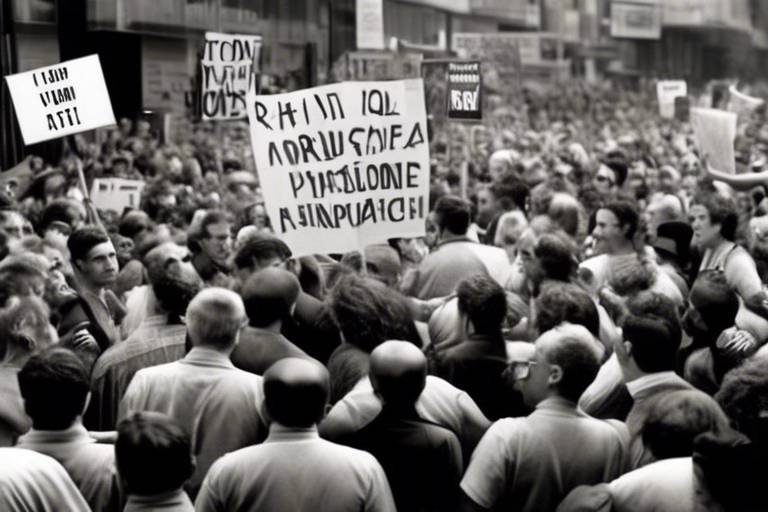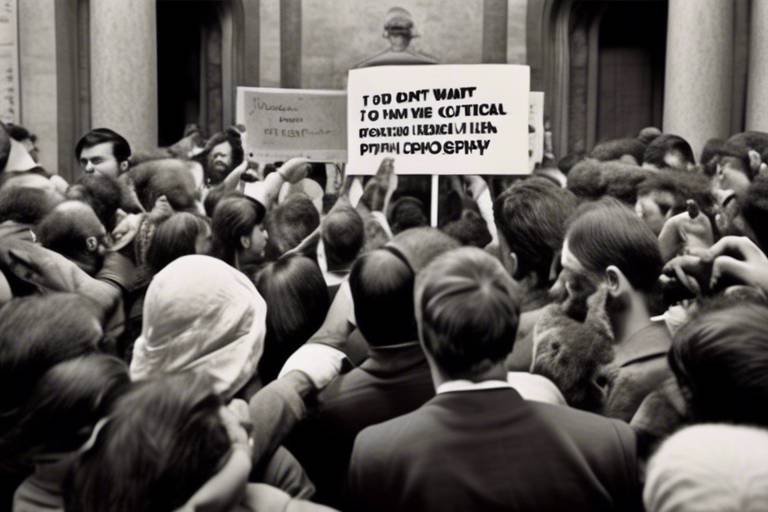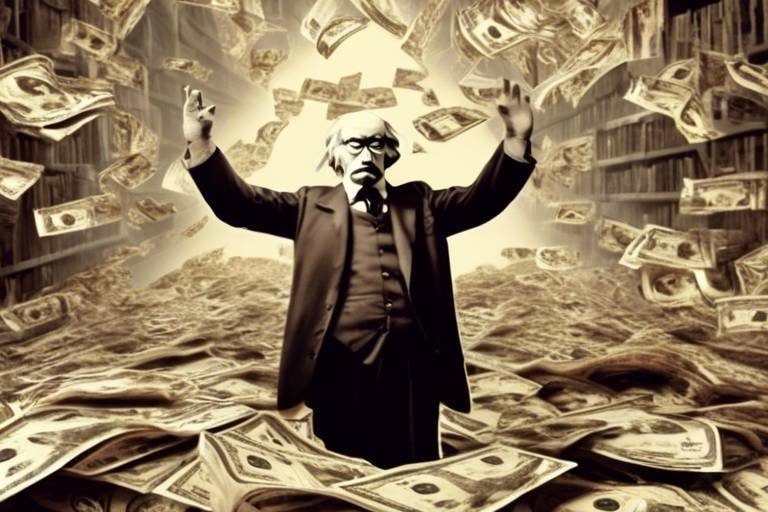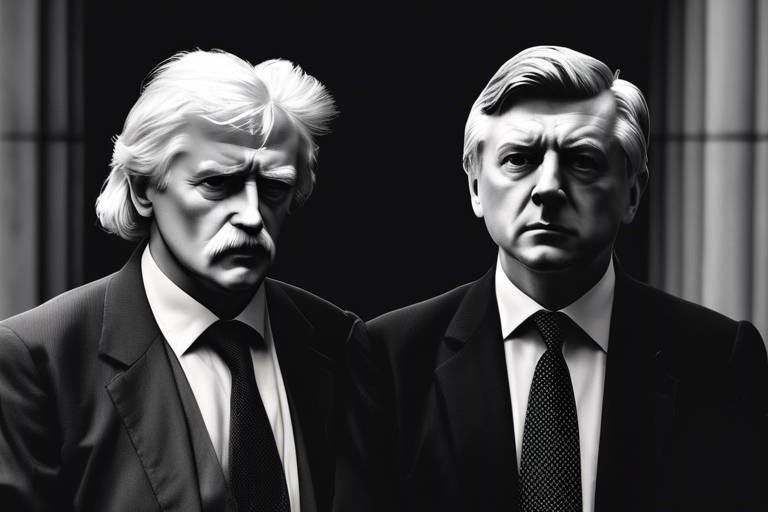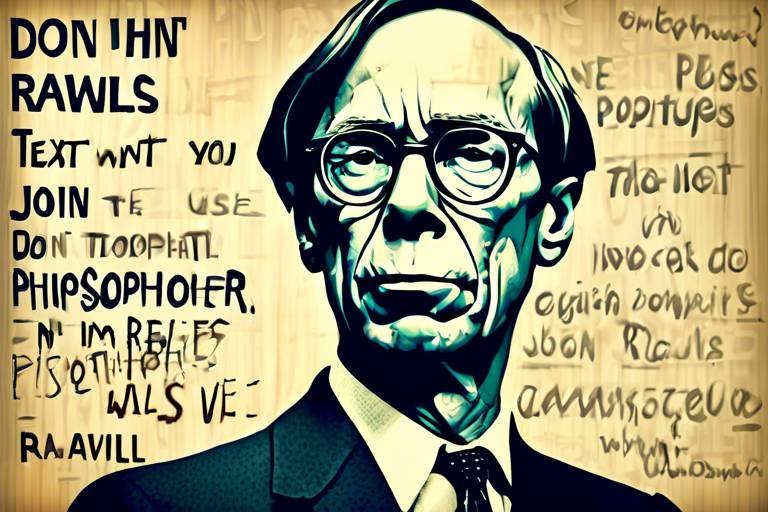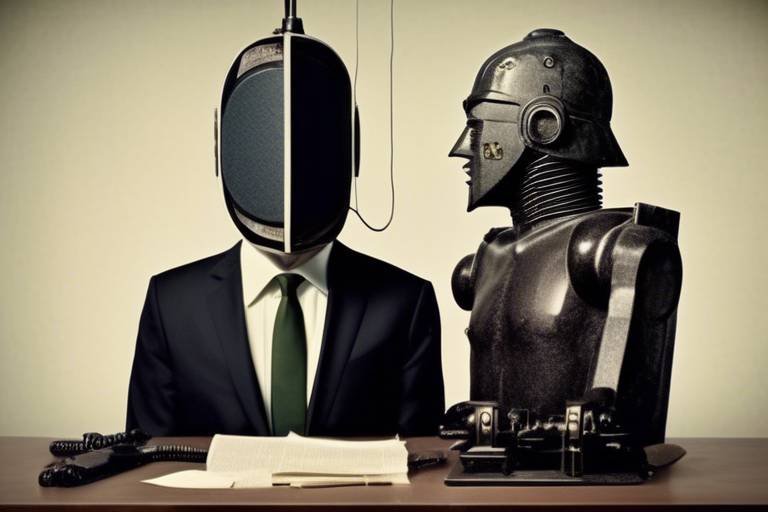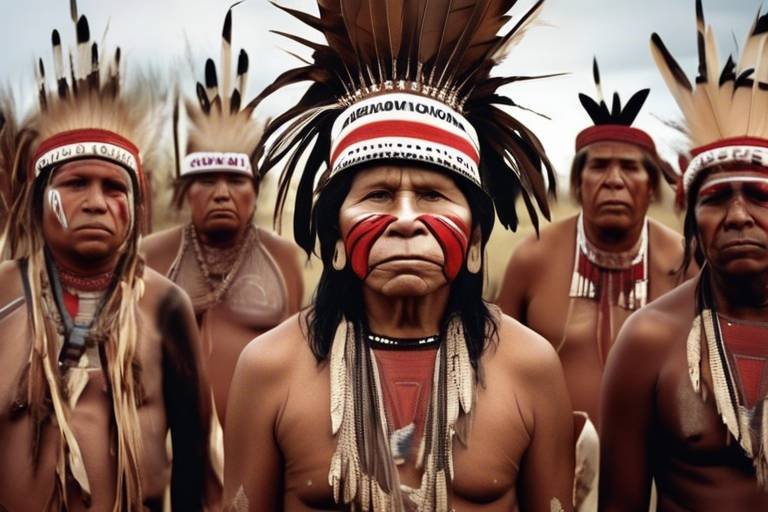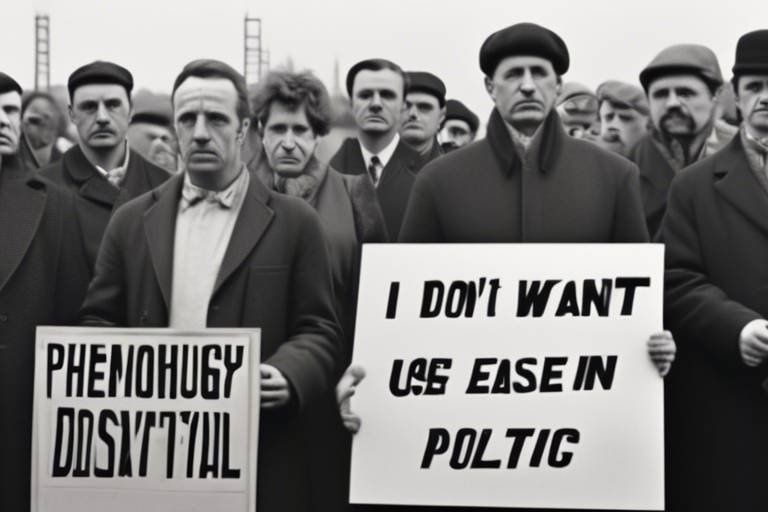Philosophy's Influence on Historical Political Events
Throughout the annals of history, philosophical ideas have acted as the bedrock upon which political structures have been built. Think about it: every significant political event, from revolutions to the drafting of constitutions, has been influenced by the thoughts and writings of philosophers. These thinkers have shaped not just the way we view governance, but also how we understand our own rights as individuals within society. It’s like planting a seed; the ideas they introduced germinated and grew into the complex political landscapes we navigate today.
In essence, philosophy serves as the lens through which we examine power, justice, and the role of the individual in society. Without the insights of ancient philosophers like Plato and Aristotle, we might not have the democratic principles we cherish today. Their explorations into ethics and governance laid the groundwork for political theory, influencing countless generations. As we journey through history, we uncover how these philosophical foundations have not only inspired political thought but have also led to tangible changes in governance and societal structures.
Moreover, the Enlightenment era marked a pivotal shift in political philosophy, introducing revolutionary ideas about democracy and human rights. Thinkers such as John Locke and Jean-Jacques Rousseau challenged existing norms, advocating for a system that prioritized individual rights and collective governance. Their ideas ignited political revolutions around the world, reshaping governments and inspiring people to fight for their rights. This era was not just a time of intellectual exploration; it was a catalyst for change that resonated across continents.
As we delve deeper into the impact of philosophical thought on political events, it becomes clear that these ideas are not just historical footnotes. They continue to influence modern political discourse, as we grapple with issues of governance, rights, and societal structures. The philosophies of the past echo in today’s debates, reminding us that the thoughts of a few can indeed shape the lives of many. In the sections that follow, we will explore key philosophers and their enduring impact on political thought, revealing how their ideas continue to resonate in our contemporary world.
- How did ancient philosophers influence modern political thought? Ancient philosophers like Plato and Aristotle laid the groundwork for political theory, introducing concepts of governance and ethics that continue to be relevant.
- What role did the Enlightenment play in shaping democracy? The Enlightenment introduced revolutionary ideas about human rights and democracy, inspiring political revolutions and the establishment of modern democratic states.
- How does Marxism relate to contemporary politics? Marxism critiques capitalism and highlights class struggles, influencing various political ideologies and movements that seek to address economic inequalities.

Ancient Philosophical Foundations
When we think about the roots of political thought, it’s impossible to ignore the profound impact of ancient philosophers like Plato and Aristotle. These thinkers didn't just ponder abstract concepts; they laid the groundwork for how societies govern themselves. Imagine a time when democracy was merely a flickering idea, and you’ll see just how revolutionary their contributions were. Plato, with his vision of the ideal state, introduced the notion that governance should be based on reason and wisdom rather than sheer power. His work, particularly in The Republic, suggests that the best rulers are philosopher-kings, individuals who possess both intellectual prowess and moral integrity.
On the other hand, Aristotle took a more pragmatic approach. He believed in the importance of empirical observation and categorizing governments into various forms. His ideas, especially those articulated in Politics, emphasized the role of the middle class in achieving a balanced government. Aristotle’s insights into the nature of justice and the purpose of the state have resonated through centuries, influencing not only political theorists but also the very structure of modern governance.
These ancient philosophical foundations can be summarized in a table that highlights their key contributions:
| Philosopher | Key Ideas | Influence on Political Thought |
|---|---|---|
| Plato | Ideal state, philosopher-kings, justice | Concept of rational governance |
| Aristotle | Empirical observation, categorization of governments | Importance of the middle class, justice |
Both philosophers tackled the fundamental questions of governance, power, and ethics. Their dialogues and writings serve as a springboard for later political theories, impacting not just Western civilization but also providing a framework for political thought across the globe. In a way, they set the stage for a grand performance where the play of politics would unfold, influencing countless generations.
Moreover, the discussions they initiated about the role of the individual in society remain pertinent today. For instance, consider how Plato’s idea of the philosopher-king can be seen in contemporary calls for leaders who are not only politically savvy but also morally upright. Similarly, Aristotle's emphasis on a balanced government echoes in modern debates about the distribution of power among different branches of government.
In essence, the ancient philosophical foundations laid by Plato and Aristotle continue to shape our understanding of political systems and governance. Their ideas challenge us to think critically about authority and the responsibilities of rulers and citizens alike. As we navigate the complexities of modern politics, reflecting on these ancient insights can provide valuable perspectives on the enduring nature of power, justice, and the common good.

The Enlightenment and Political Revolution
The Enlightenment, often dubbed the Age of Reason, was a pivotal period that transformed the landscape of political thought and governance. Emerging in the late 17th and 18th centuries, this intellectual movement championed the power of human reason, individualism, and skepticism of traditional authority. Thinkers of this era, such as John Locke and Jean-Jacques Rousseau, laid the philosophical groundwork for modern democracy, fundamentally reshaping how societies viewed governance and the role of the individual within it.
During this time, the notion that governments should be based on the consent of the governed gained traction. This revolutionary idea was a sharp departure from the prevailing monarchies and autocratic systems that dominated Europe. Enlightenment philosophers argued that individuals possessed inherent rights and that any legitimate government must respect and protect these rights. The result? A wave of political revolutions that swept across the globe, igniting the flames of change and inspiring movements for liberty and justice.
One of the most significant contributions of the Enlightenment was the concept of the social contract. This idea posited that individuals willingly relinquish some of their freedoms to a governing body in exchange for protection and the maintenance of order. This mutual agreement between the governed and the government became a cornerstone of democratic theory. Philosophers like Locke articulated the importance of this contract, emphasizing that if a government fails to uphold its end of the bargain, the people have the right to revolt and establish a new system.
As the Enlightenment ideals spread, they fueled revolutionary movements across Europe and the Americas. The American Revolution (1775-1783) was a direct manifestation of these principles, as colonists sought to break free from British rule, demanding a government that reflected their rights and aspirations. Similarly, the French Revolution (1789-1799) was heavily influenced by Enlightenment thought, as revolutionaries challenged the monarchy and sought to establish a republic based on the principles of liberty, equality, and fraternity.
To illustrate the impact of Enlightenment thinkers on political revolutions, consider the following table:
| Philosopher | Key Ideas | Influence on Revolution |
|---|---|---|
| John Locke | Social contract, natural rights | Inspired American Revolution, emphasized government accountability |
| Jean-Jacques Rousseau | General will, direct democracy | Influenced French Revolution, advocated for collective decision-making |
| Voltaire | Freedom of speech, separation of church and state | Challenged oppressive regimes, inspired calls for civil liberties |
As we reflect on the Enlightenment's legacy, it becomes clear that its ideas were not merely academic musings; they were the lifeblood of political change. The principles of democracy, human rights, and the rule of law that we often take for granted today are rooted in the revolutionary thoughts of this era. Without the bold assertions of Enlightenment thinkers, who knows how history would have unfolded?
In conclusion, the Enlightenment was not just a philosophical movement; it was a catalyst for political revolution. The ideas birthed during this time continue to resonate, reminding us of the power of thought to inspire action and the importance of safeguarding individual rights in the face of authority. As we navigate the complexities of modern governance, we would do well to remember the lessons of the Enlightenment and strive to uphold the principles of reason, liberty, and justice for all.
- What was the main idea of the Enlightenment? The Enlightenment emphasized reason, individualism, and the social contract, advocating for the protection of individual rights and the accountability of governments.
- How did Enlightenment thinkers influence revolutions? Enlightenment thinkers provided the philosophical foundation for revolutions, arguing for democracy, human rights, and the right to revolt against oppressive governments.
- What role did John Locke play in political thought? John Locke's theories on natural rights and the social contract significantly influenced the American Revolution and the development of modern democratic principles.

Locke's Social Contract Theory
John Locke's social contract theory is a cornerstone of modern political thought, fundamentally reshaping our understanding of governance and individual rights. Imagine a world where the authority of rulers is not derived from divine right or brute force but rather from the consent of the governed. Locke proposed that individuals enter into a social contract, relinquishing some of their freedoms in exchange for protection and the assurance of their natural rights. This idea was revolutionary, suggesting that the legitimacy of government lies in its ability to serve the people rather than oppress them.
Locke's philosophy emphasizes three essential natural rights: life, liberty, and property. He argued that these rights are inherent to all individuals and that any government must protect them. If a government fails to uphold these rights, Locke believed that the people have not only the right but the duty to revolt. This notion was a radical departure from the prevailing ideas of his time and laid the groundwork for the principles of democracy that we cherish today.
To better understand Locke's social contract theory, let’s break down its key components:
- State of Nature: Locke described a pre-political state where individuals lived in complete freedom and equality. However, this state was also fraught with uncertainty and conflict.
- Social Contract: To escape the chaos of the state of nature, individuals collectively agree to form a government, which is tasked with protecting their rights.
- Right to Revolt: If the government fails to protect these rights, citizens are justified in overthrowing it, reinstating their natural rights.
This framework not only influenced the American Revolution but also became a vital part of the U.S. Constitution. The framers were deeply inspired by Locke’s ideas, embedding the principles of life, liberty, and the pursuit of happiness into the very fabric of American democracy. It’s almost as if they took Locke's philosophical blueprint and constructed a nation around it, ensuring that the government would be accountable to the people it served.
Furthermore, Locke's social contract theory has had a lasting impact on modern political ideologies, particularly liberalism. His advocacy for limited government and personal freedoms resonates strongly in today's political discourse, where debates about individual rights and governmental authority continue to unfold. Locke’s ideas serve as a reminder that the power of the state is derived from the people, echoing through centuries of political thought and action.
In summary, Locke's social contract theory is not just a relic of philosophical history; it is a living, breathing concept that continues to influence our understanding of governance. By asserting that power should rest with the people and that governments must be held accountable, Locke has left an indelible mark on the evolution of democratic thought. His legacy reminds us that the fight for individual rights and freedoms is as vital today as it was in the 17th century.

Impact on the American Constitution
John Locke's philosophical ideas had a profound impact on the formation of the American Constitution. His principles of natural rights, particularly the concepts of life, liberty, and property, were revolutionary at the time and served as a guiding light for the framers of this foundational document. Locke argued that individuals possess inherent rights simply by virtue of being human, and that the primary role of government is to protect these rights. This notion was groundbreaking and fundamentally altered the way people viewed governance.
When the Founding Fathers convened to draft the Constitution, they were deeply influenced by Locke's social contract theory. This theory posits that governments derive their authority from the consent of the governed. In essence, the people grant power to their leaders in exchange for the protection of their rights. This idea became a cornerstone of the Constitution, establishing a framework for a government that is accountable to its citizens. The framers were not just creating a set of laws; they were designing a system that would ensure that the government could not infringe upon the rights of the individual.
Furthermore, Locke's emphasis on the separation of powers resonated strongly with the framers. They understood that to prevent tyranny, it was essential to divide governmental authority among different branches. This led to the establishment of the legislative, executive, and judicial branches, each with its own distinct powers and responsibilities. This separation was designed to create a system of checks and balances, ensuring that no single entity could dominate the government or violate the rights of the people.
Locke’s influence is perhaps most clearly reflected in the Declaration of Independence, where Thomas Jefferson echoed Locke’s ideas by stating that all men are created equal and endowed with certain unalienable rights. This declaration was not merely a statement of intent; it was a revolutionary act that justified the colonies' break from British rule. The Constitution further solidified these ideals, embedding them into the very fabric of American governance.
In summary, the impact of Locke's philosophy on the American Constitution cannot be overstated. His ideas formed the bedrock of a new political system that prioritized individual rights and government accountability. As a result, the Constitution has not only endured but has also inspired countless democratic movements around the world. It stands as a testament to the power of philosophical thought in shaping political realities.
- What are natural rights according to John Locke? Natural rights are fundamental rights that every individual is entitled to, including life, liberty, and property.
- How did Locke's ideas influence the Declaration of Independence? Locke's emphasis on individual rights and government accountability greatly influenced Thomas Jefferson's writing, particularly the assertion that all men are created equal.
- What is the significance of the separation of powers in the Constitution? The separation of powers is crucial for preventing any one branch of government from becoming too powerful, thereby protecting individual rights.
- How does Locke's social contract theory relate to modern democracy? Locke's theory underpins the idea that governments should be based on the consent of the governed, a fundamental principle in modern democratic systems.
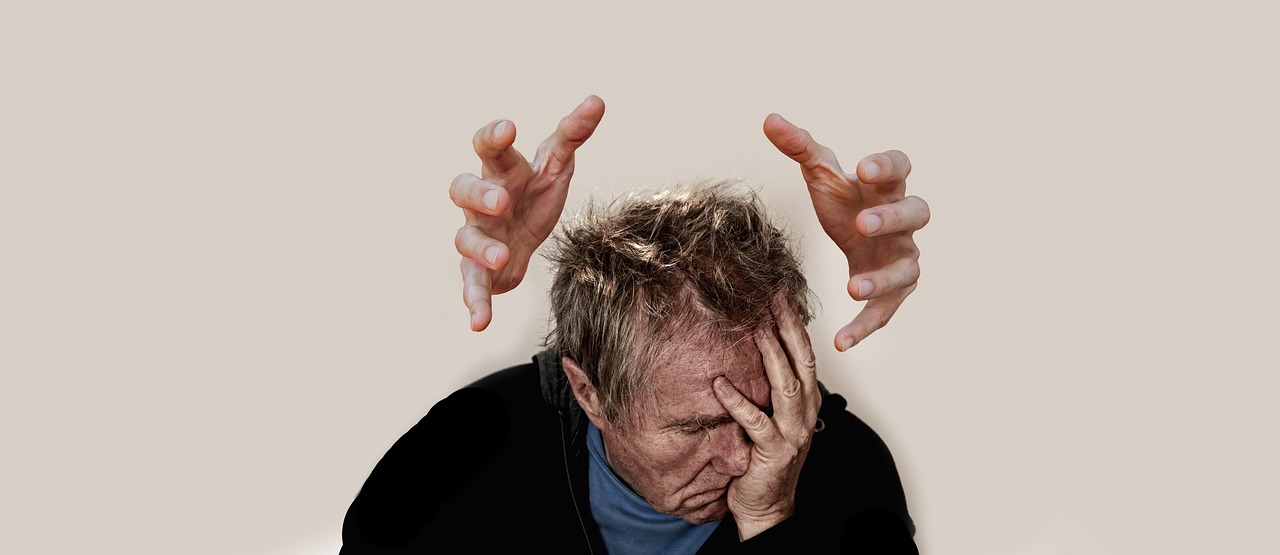
Influence on Modern Liberalism
Modern liberalism, a political ideology that champions individual freedoms, equality, and limited government, owes much of its foundation to the philosophical insights of John Locke. His emphasis on personal rights and the social contract has been a beacon for those advocating for democratic governance and civil liberties. But what exactly does this mean for today's political landscape?
Locke's ideas about the necessity of government being accountable to the people have permeated various aspects of modern society. For instance, the belief that individuals possess inherent rights to life, liberty, and property has become a cornerstone of liberal thought. This framework not only shapes political discourse but also influences social movements that seek to protect these rights against authoritarianism.
One of the most significant impacts of Locke's philosophy is evident in the ongoing debates surrounding personal freedoms. In contemporary discussions about privacy, freedom of expression, and the role of government in our lives, Locke's principles act as a guiding light. For example, consider the ongoing conversations about surveillance and data privacy. Many argue that excessive government oversight infringes upon individual rights, echoing Locke's insistence on limited governmental power.
Moreover, Locke’s influence extends beyond mere political theory; it has practical implications in the realm of economic policy. The advocacy for free-market economies, where individuals can pursue their interests with minimal interference, is deeply rooted in liberal thought. This notion promotes not only economic growth but also social mobility, enabling individuals to improve their circumstances through hard work and innovation.
Interestingly, modern liberalism is often contrasted with other ideologies, such as conservatism and socialism. While conservatives might prioritize tradition and social order, and socialists focus on collective ownership and equality, liberalism seeks a balance between individual rights and community welfare. This nuanced stance allows for a diverse array of political discussions and policy implementations.
To illustrate the interplay between Locke's philosophy and modern liberalism, consider the following table:
| Key Concepts | Locke's Influence | Modern Liberalism |
|---|---|---|
| Individual Rights | Inherent rights to life, liberty, and property | Protection of civil liberties and personal freedoms |
| Government Accountability | Social contract requires government to serve the people | Democratic institutions and checks and balances |
| Economic Freedom | Advocacy for property rights and free markets | Promotion of entrepreneurship and innovation |
In conclusion, the influence of Locke on modern liberalism is profound and multifaceted. His ideas not only shaped the foundational principles of democratic governance but also continue to inspire movements advocating for personal freedoms and limited government intervention. As we navigate the complexities of modern politics, Locke's legacy remains a vital part of our discourse, reminding us of the importance of safeguarding individual rights in the face of evolving challenges.
- What is modern liberalism? Modern liberalism is a political ideology that emphasizes individual freedoms, equality, and limited government intervention in personal lives.
- How did John Locke influence modern political thought? Locke's ideas about the social contract and individual rights laid the groundwork for modern democratic principles and liberal thought.
- Why are individual rights important in modern liberalism? Individual rights are crucial as they ensure personal freedoms and protect citizens from government overreach.
- What role does government play in modern liberalism? In modern liberalism, the government is seen as a necessary entity that must be accountable to the people and protect their rights.

Rousseau and the General Will
Ah, Jean-Jacques Rousseau! A name that echoes through the annals of political philosophy, challenging the status quo and advocating for a new kind of governance. Rousseau's concept of the general will is nothing short of revolutionary, a beacon of hope for those who yearn for a more equitable society. But what exactly does this mean? In simple terms, the general will refers to the collective will of the people, the common good that transcends individual interests. Rousseau believed that true freedom is found not in the pursuit of personal desires but in the alignment with the general will.
Imagine a community where every voice matters, where decisions are made not by a select few but through the collective agreement of all. This was Rousseau's vision—a direct democracy where the citizens actively participate in shaping their society. He argued that when individuals come together to form a social contract, they should prioritize the collective over the individual, fostering a sense of community and shared responsibility. This idea sparked a fire that ignited revolutionary movements, particularly during the French Revolution, where the quest for liberty, equality, and fraternity resonated deeply with Rousseau's philosophy.
Rousseau's thoughts on the general will were not just theoretical musings; they had real-world implications. He challenged traditional authority, advocating for a system where the legitimacy of power comes from the consent of the governed. This was a radical departure from the monarchies of his time, where rulers claimed divine right. Rousseau insisted that the government should reflect the will of the people, and if it failed to do so, the citizens had the right to revolt. His ideas laid the groundwork for modern democratic thought, inspiring countless movements that sought to empower the populace.
Now, you might be wondering, how does this apply to today’s political landscape? The essence of Rousseau's general will is still very much alive. In an age where individualism often reigns supreme, his call for collective action and community engagement is a reminder that we are stronger together. The challenges we face—be it climate change, social justice, or economic inequality—demand a united front, a general will that prioritizes the common good over personal gain.
In summary, Rousseau's concept of the general will serves as a powerful reminder of the importance of community and collective decision-making. His ideas continue to influence political thought and practice, urging us to consider the greater good in our pursuits. As we navigate the complexities of modern governance, let us not forget Rousseau's call for a society where the general will guides our actions and decisions.
- What is the general will according to Rousseau? The general will is the collective will of the people, representing the common good that transcends individual interests.
- How did Rousseau's ideas influence the French Revolution? Rousseau's advocacy for direct democracy and the prioritization of the general will inspired revolutionary movements that sought to empower the populace and challenge traditional authority.
- Why is the concept of the general will relevant today? In a world facing numerous challenges, Rousseau's call for collective action and community engagement serves as a reminder of the importance of prioritizing the common good over individual interests.

Marxism and Political Ideologies
When we think about the impact of Marxism on political ideologies, it’s essential to understand that Karl Marx didn’t just critique capitalism; he opened the door to a new way of thinking about society and governance. His ideas sparked a revolution—not just in the streets but in the minds of thinkers and activists around the world. By analyzing the structures of capitalism, Marx shed light on the class struggles that define human history. This was not merely an academic exercise; it was a clarion call for the oppressed, urging them to rise against their oppressors.
Marx's critique centered on the inherent inequalities within capitalist societies, where the bourgeoisie, or the ruling class, exploits the proletariat, or the working class. He argued that this exploitation leads to alienation, where workers become disconnected from the products of their labor and, ultimately, from their own humanity. This perspective reshaped political thought and inspired a plethora of movements aimed at addressing these inequalities.
As Marx's ideas gained traction, they laid the groundwork for various socialist movements across the globe. These movements sought to address economic disparities and empower the working class. For example, the rise of labor unions in the late 19th and early 20th centuries can be traced back to Marxist principles, as workers banded together to demand better wages, working conditions, and rights. The influence of Marxism can be summarized in several key points:
- Class Struggle: The ongoing conflict between different classes is a central theme in Marxist thought.
- Collective Ownership: Marx advocated for the means of production to be owned collectively, rather than by individuals.
- Revolutionary Change: Marx believed that a revolution was necessary to overthrow capitalist systems and establish a classless society.
Fast forward to the 20th century, and we see Marxism's profound legacy in the formation of various political ideologies and movements. From the Bolshevik Revolution in Russia to the rise of communist regimes in China and Cuba, Marx's ideas were put into practice in ways that reshaped entire nations. Yet, this legacy is not without its controversies. The implementation of Marxist principles often led to authoritarian regimes that contradicted the very ideals of freedom and equality that Marx espoused. This paradox has sparked heated debates among scholars and political theorists about the true meaning and application of Marxist thought.
Today, the conversation continues, as Marxism influences contemporary political ideologies. Many modern leftist movements draw on Marxist critique to argue for economic reforms and social justice. The debates around socialism, communism, and the role of government in economic affairs are more relevant than ever, particularly in light of rising economic inequalities and social unrest. As we navigate these discussions, it's crucial to remember that Marxism is not just a relic of the past; it is a living ideology that continues to inspire and provoke thought and action.
- What is Marxism? Marxism is a socio-political and economic theory that critiques capitalism and advocates for a classless society through collective ownership of the means of production.
- How did Marxism influence political movements? Marxism inspired various socialist and communist movements around the world, leading to revolutions and the establishment of states that sought to implement Marxist principles.
- Is Marxism still relevant today? Yes, Marxism remains relevant as it informs contemporary discussions on economic inequality, workers' rights, and social justice.

Marx's Critique of Capitalism
Karl Marx's critique of capitalism is not merely an academic exercise; it's a profound exploration of the economic system that has shaped modern society. At its core, Marx argued that capitalism is inherently exploitative, creating a divide between the bourgeoisie (the ruling class) and the proletariat (the working class). This division leads to class struggles, which Marx believed were the driving force of historical development. He famously stated that "the history of all hitherto existing society is the history of class struggles," highlighting how economic inequalities fuel conflict and social change.
One of the key elements of Marx's critique lies in his analysis of labor. He posited that under capitalism, workers sell their labor to survive, but in doing so, they become alienated from the products of their work. This alienation occurs because the fruits of their labor are appropriated by capitalists, who profit from the workers' efforts without adequately compensating them. Marx believed that this exploitation not only dehumanizes individuals but also undermines the very fabric of society, leading to social unrest and revolutionary movements.
Marx's ideas were revolutionary for his time, as they challenged the status quo and called for a radical restructuring of society. He envisioned a world where the means of production would be collectively owned, eliminating the class distinctions that capitalism perpetuates. In his view, such a transformation would empower the proletariat, allowing them to reclaim their labor and achieve true freedom.
To further understand Marx's critique, it's helpful to consider some of the key concepts he introduced:
- Surplus Value: The difference between what workers are paid and the value of the goods they produce, which is appropriated by capitalists.
- Historical Materialism: The theory that material conditions and economic factors drive historical change, rather than ideas or ideals.
- Class Consciousness: The awareness of one's social class and its interests, which Marx believed was essential for the proletariat to unite and overthrow capitalism.
Marx's critique of capitalism has had a lasting impact on political thought and revolutionary movements. His ideas inspired a myriad of socialist and communist movements across the globe, from the Russian Revolution to the Chinese Communist Party. These movements sought to implement Marx's vision of a classless society, although the outcomes varied significantly from his original ideals.
Today, discussions around Marx's critique are more relevant than ever, as debates about economic inequality, workers' rights, and the role of government in regulating capitalism continue to dominate political discourse. While some dismiss Marx as outdated, others argue that his insights into the nature of capitalism remain crucial for understanding the challenges we face in a rapidly changing world.
- What is Marx's main critique of capitalism? Marx argues that capitalism is exploitative, creating a divide between the bourgeoisie and the proletariat, leading to class struggles.
- What does Marx mean by "alienation"? Alienation refers to the disconnection workers feel from the products of their labor, as they do not benefit from the value they create.
- How did Marx's ideas influence political movements? Marx's critique inspired various socialist and communist movements that aimed to challenge capitalism and establish classless societies.
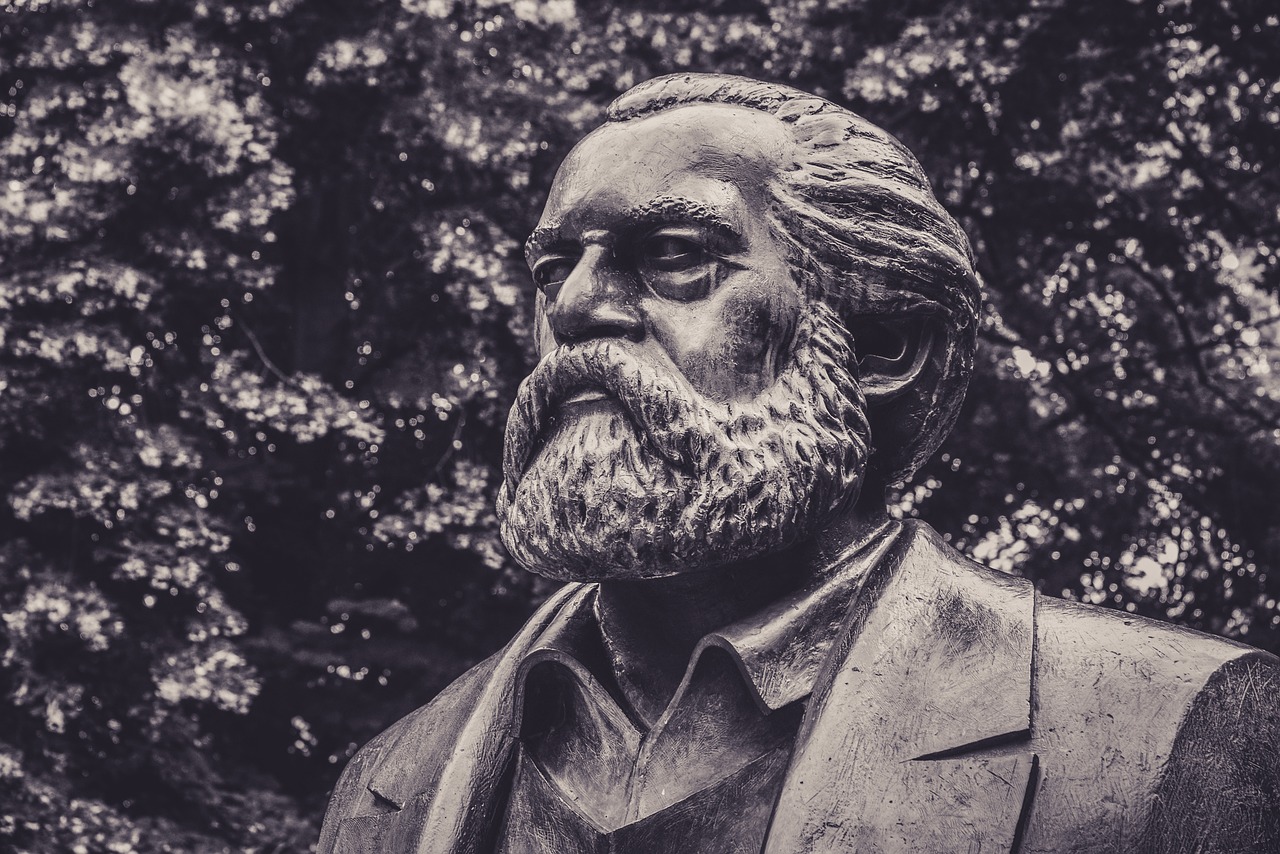
Legacy of Marxist Thought
The legacy of Marxist thought has profoundly shaped political landscapes across the globe, influencing a plethora of movements and ideologies that continue to resonate today. At its core, Marxism critiques the dynamics of capitalism and class struggle, advocating for a society where the means of production are owned communally rather than privately. This fundamental idea sparked a wave of revolutionary movements throughout the 19th and 20th centuries, leading to the establishment of various socialist and communist states.
One of the most significant impacts of Marxist thought is its ability to galvanize the working class. Marx's theories provided a framework for understanding the exploitation inherent in capitalist systems, which in turn inspired labor movements and socialist parties worldwide. For example, the rise of the Labor Movement in the United States and Europe can be traced back to Marxist principles, as workers organized to demand better wages, working conditions, and rights. The following table illustrates some key events influenced by Marxist thought:
| Event | Date | Influence of Marxist Thought |
|---|---|---|
| Russian Revolution | 1917 | Led to the establishment of the Soviet Union, a state founded on Marxist principles. |
| Chinese Revolution | 1949 | Resulted in the establishment of a communist state under Mao Zedong, inspired by Marxist-Leninist ideology. |
| Cuban Revolution | 1959 | Overthrew a capitalist regime, leading to the establishment of a socialist government. |
Moreover, the legacy of Marxism extends beyond political revolutions. It has also permeated various fields such as economics, philosophy, and cultural studies. For instance, Marxist analysis has been utilized to critique literature and art, examining how cultural products reflect and reinforce societal structures. This intersection of Marxism with cultural critique has given rise to cultural Marxism, which explores the relationship between culture, politics, and power.
Despite its historical significance, Marxist thought remains a contentious topic in contemporary political discourse. Debates surrounding socialism and communism often invoke Marxist principles, leading to discussions about the role of government in economic affairs. In many democratic nations, the influence of Marxism can be seen in the advocacy for social welfare programs, universal healthcare, and workers' rights—issues that resonate with Marx's vision of a more equitable society.
In conclusion, the legacy of Marxist thought is a testament to its enduring relevance in shaping political ideologies and movements. While the practical applications of Marxism have varied widely, its core principles continue to inspire those who seek to challenge economic inequalities and advocate for social justice. As we navigate the complexities of modern governance and economic systems, the lessons of Marxism offer valuable insights into the ongoing struggle for a fairer world.
- What is the main idea behind Marxism?
Marxism critiques capitalism and advocates for a classless society where the means of production are communally owned. - How has Marxism influenced modern politics?
Marxism has inspired labor movements, socialist parties, and various revolutionary movements around the world. - Is Marxism relevant today?
Yes, Marxist thought continues to influence discussions about economic inequality, social justice, and the role of government in society.
Frequently Asked Questions
- How did ancient philosophers influence modern political thought?
Ancient philosophers like Plato and Aristotle laid the foundational ideas for governance and political theory. Their discussions on justice, virtue, and the role of citizens in a state have echoed through centuries, shaping the frameworks of modern democracies and political systems.
- What role did Enlightenment thinkers play in political revolutions?
The Enlightenment was a pivotal era that introduced revolutionary ideas about democracy, individual rights, and government accountability. Thinkers like John Locke and Jean-Jacques Rousseau inspired movements such as the American and French Revolutions, advocating for the rights of individuals and the importance of collective governance.
- What is Locke's social contract theory?
John Locke's social contract theory posits that governments are formed through the consent of the governed, emphasizing individual rights and the accountability of rulers. This concept was instrumental during the American Revolution, as it provided a philosophical basis for challenging tyranny and advocating for democratic principles.
- How did Locke influence the U.S. Constitution?
Locke's ideas directly influenced the framers of the U.S. Constitution, embedding essential principles such as life, liberty, and the pursuit of happiness. His philosophy helped shape the Constitution's framework, ensuring that individual rights were protected and that government power was limited.
- What is Rousseau's concept of the general will?
Rousseau's concept of the general will emphasizes the collective interests of the people, advocating for direct democracy and shared decision-making. This idea challenged traditional authority and inspired revolutionary movements, particularly in France, where it fueled demands for a government that truly represented the populace.
- How did Marxism critique capitalism?
Karl Marx's critique of capitalism focused on the inherent class struggles and economic inequalities it perpetuates. He argued that capitalism exploits the working class, leading to social unrest and the need for revolutionary change to establish a more equitable system through socialism and communism.
- What is the legacy of Marxist thought today?
The legacy of Marxism continues to influence contemporary political ideologies, sparking debates about socialism, economic equality, and the role of government in regulating markets. Marx's ideas still resonate in discussions about workers' rights and the distribution of wealth in modern economies.




